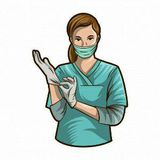


ATRIAL FIBRILLATION
Episodes of atrial fibrillation may come and go, or you may develop atrial fibrillation that doesn't go away and may require treatment. Although atrial fibrillation itself usually isn't life-threatening, it is a serious medical condition that sometimes requires emergency treatment. A major concern with atrial fibrillation is the potential to develop blood clots within the upper chambers of the heart. These blood clots forming in the heart may circulate to other organs and lead to blocked blood flow (ischemia). Treatments for atrial fibrillation may include medications and other interventions to try to alter the heart's electrical system. Symptoms Some people with atrial fibrillation have no symptoms and are unaware of their condition until it's discovered during a physical examination. Those who do have atrial fibrillation symptoms may experience signs and symptoms such as: Palpitations, which are sensations of a racing, uncomfortable, irregular heartbeat or a flip-flopping in your chest Weakness Reduced ability to exercise Fatigue Lightheadedness Dizziness Shortness of breath Chest pain Atrial fibrillation may be: Occasional. In this case it's called paroxysmal (par-ok-SIZ-mul) atrial fibrillation. You may have symptoms that come and go, usually lasting for a few minutes to hours. Sometimes symptoms occur for as long as a week and episodes can happen repeatedly. Your symptoms might go away on their own or you may need treatment. Persistent. With this type of atrial fibrillation, your heart rhythm doesn't go back to normal on its own. If you have persistent atrial fibrillation, you'll need treatment such as an electrical shock or medications in order to restore your heart rhythm. Long-standing persistent. This type of atrial fibrillation is continuous and lasts longer than 12 months. Permanent. In this type of atrial fibrillation, the abnormal heart rhythm can't be restored. You'll have atrial fibrillation permanently, and you'll often require medications to control your heart rate and to prevent blood clots. When to see a doctor If you have any symptoms of atrial fibrillation, make an appointment with your doctor. Your doctor may order an electrocardiogram to determine if your symptoms are related to atrial fibrillation or another heart rhythm disorder (arrhythmia). If you have chest pain, seek emergency medical assistance immediately. Chest pain could signal that you're having a heart attack. Causes Atrial fibrillation is an irregular and often rapid heart rate that occurs when the two upper chambers of your heart experience chaotic electrical signals. The result is a fast and irregular heart rhythm. The heart rate in atrial fibrillation may range from 100 to 175 beats a minute. The normal range for a heart rate is 60 to 100 beats a minute. Your heart is made up of four chambers — two upper chambers (atria) and two lower chambers (ventricles). Within the upper right chamber of your heart (right atrium) is a group of cells called the sinus node. This is your heart's natural pacemaker. The sinus node produces the signal that normally starts each heartbeat. Normally, the signal travels through the two upper heart chambers, and then through a connecting pathway between the upper and lower chambers called the atrioventricular (AV) node. The movement of the signal causes your heart to squeeze (contract), sending blood to your heart and body. In atrial fibrillation, the signals in the upper chambers of your heart are chaotic. As a result, they quiver. The AV node — the electrical connection between the atria and the ventricles — is bombarded with impulses trying to get through to the ventricles. The ventricles also beat rapidly, but not as rapidly as the atria, as not all the impulses get through. Possible causes of atrial fibrillation Abnormalities or damage to the heart's structure are the most common cause of atrial fibrillation. Possible causes of atrial fibrillation include: High blood pressure Heart attack Coronary artery disease Abnormal heart valves Heart defects you're born with (congenital) An overactive thyroid gland or other metabolic imbalance Exposure to stimulants, such as medications, caffeine, tobacco or alcohol Sick sinus syndrome — improper functioning of the heart's natural pacemaker Lung diseases Previous heart surgery Viral infections Stress due to surgery, pneumonia or other illnesses Sleep apnea However, some people who have atrial fibrillation don't have any heart defects or damage, a condition called lone atrial fibrillation. In lone atrial fibrillation, the cause is often unclear, and serious complications are rare.
Source: https://images.app.goo.gl/PrJkb3mziCjgL7VH7

